Survey Report
 Public opinion about legalizing marijuana, while little changed in the past few years, has undergone a dramatic long-term shift. A new survey finds that 53% favor the legal use of marijuana, while 44% are opposed. As recently as 2006, just 32% supported marijuana legalization, while nearly twice as many (60%) were opposed.
Public opinion about legalizing marijuana, while little changed in the past few years, has undergone a dramatic long-term shift. A new survey finds that 53% favor the legal use of marijuana, while 44% are opposed. As recently as 2006, just 32% supported marijuana legalization, while nearly twice as many (60%) were opposed.
Millennials (currently 18-34) have been in the forefront of this change: 68% favor legalizing marijuana use, by far the highest percentage of any age cohort. But across all generations –except for the Silent Generation (ages 70-87) – support for legalization has risen sharply over the past decade.
The latest national survey by the Pew Research Center, conducted March 25-29 among 1,500 adults, finds that supporters of legalizing the use of marijuana are far more likely than opponents to say they have changed their mind on this issue. 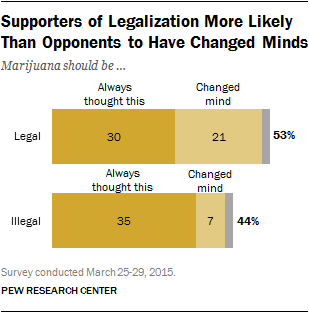
Among the public overall, 30% say they support legalizing marijuana use and have always felt that way, while 21% have changed their minds; they say there was a time when they thought it should be illegal. By contrast, 35% say they oppose legalization and have always felt that way; just 7% have changed their minds from supporting to opposing legalization.
When asked, in their own words, why they favor or oppose legalizing marijuana, people on opposite sides of the issue offer very different perspectives. But a common theme is the danger posed by marijuana: Supporters of legalization mention its perceived health benefits, or see it as no more dangerous than other drugs. To opponents, it is a dangerous drug, one that inflicts damage on people and society more generally. 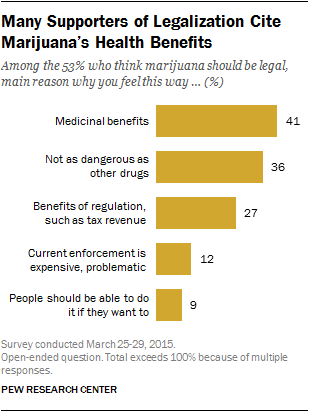
The most frequently cited reasons for supporting the legalization of marijuana are its medicinal benefits (41%) and the belief that marijuana is no worse than other drugs (36%) –with many explicitly mentioning that they think it is no more dangerous than alcohol or cigarettes.
With four states and Washington, D.C. having passed measures to permit the use of marijuana for personal use, 27% of supporters say legalization would lead to improved regulation of marijuana and increased tax revenues. About one-in-ten (12%) cite the costs and problems of enforcing marijuana laws or say simply that people should be free to use marijuana (9%).
Why Should Marijuana Be Legal? Voices of Supporters
Main reason you support legalizing use of marijuana…
“It is not as harmful as alcohol. […] It also helps medical conditions as a more natural substitute to pharmaceuticals.” Female, 46
“My grandson was diagnosed with epilepsy a year ago and it has been proven that it helps with the seizures.” Female, 69
“I think crime would be lower if they legalized marijuana. It would put the drug dealers out of business.” Female, 62
“Because people should be allowed to have control over their body and not have the government intervene in that.” Male, 18
“I think that we would have more control over it by allowing a federal agency to tax and regulate it like alcohol.” Male, 25
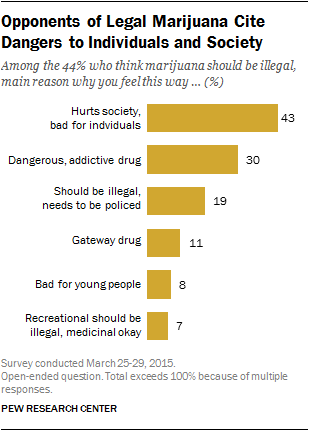
The most frequently mentioned reason why people oppose legalization is that marijuana generally hurts society and is bad for individuals (43% say this). And while many supporters of legalization say that marijuana is less dangerous than other drugs, 30% of opponents have the opposite view: They point to the dangers of marijuana, including the possibility of abuse and addiction.
About one-in-five opponents of legalization (19%) say marijuana is illegal and needs to be policed, 11% say it is a gateway to harder drugs and 8% say it is especially harmful to young people. A small share of opponents (7%) say that while the recreational use of marijuana should be illegal, they do not object to legalizing medical marijuana.1
Why Should Marijuana Be Illegal? Voices of Opponents
Main reason you oppose legalizing use of marijuana…
“It’s a drug and it has considerable side effects. It should not be used recreationally, only for medicinal use.” Female, 20
“It’s a drug that makes you stupid. It affects your judgment and motor skills and in the long term it makes you lazy.” Male, 52
“It gets too many people on drugs. It would put too many drugs on the street, we don’t need that.” Male, 84
“I’m thinking of my child. I don’t want her to try this. I know it’s not good for her health or brain.” Female, 33
“We have enough addictive things that are already legal. We don’t need another one.” Male, 42
Current Opinion on Legalizing Marijuana
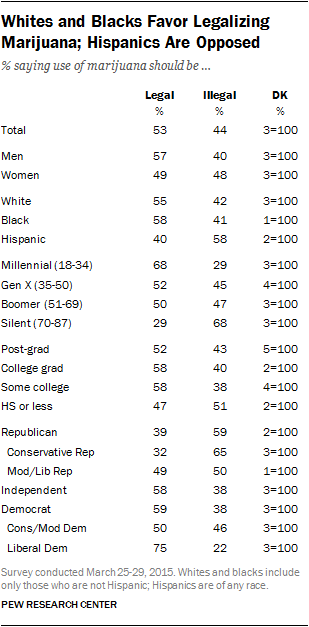 The pattern of opinion about legalizing marijuana has changed little in recent years. Beyond the wide generation gap in support for legalization, there continue to be demographic and partisan differences.
The pattern of opinion about legalizing marijuana has changed little in recent years. Beyond the wide generation gap in support for legalization, there continue to be demographic and partisan differences.
Majorities of blacks (58%) and whites (55%) favor legalizing marijuana, compared with just 40% of Hispanics. Men (57% favor) continue to be more likely than women (49%) to support legalization.
Nearly six-in-ten Democrats (59%) favor legalizing the use of marijuana, as do 58% of independents. That compares with just 39% of Republicans.
Both parties are ideologically divided over legalizing marijuana. Conservative Republicans oppose legalizing marijuana by roughly two-to-one (65% to 32%); moderate and liberal Republicans are divided (49% favor legalization, 50% are opposed).
Among Democrats, 75% of liberals say the use of marijuana should be legal compared with half (50%) of conservative and moderate Democrats.
Views of Legalizing Marijuana, 1969-2015
Other Opinions: Federal Enforcement of Marijuana Laws
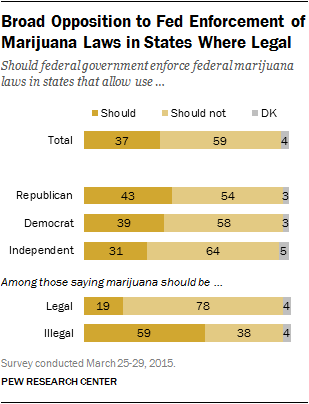 The new survey also finds that as some states have legalized marijuana – placing them at odds with the federal prohibition against marijuana – a majority of Americans (59%) say that the federal government should not enforce laws in states that allow marijuana use; 37% say that they should enforce these laws. Views on federal enforcement of marijuana laws are unchanged since the question was first asked two years ago.
The new survey also finds that as some states have legalized marijuana – placing them at odds with the federal prohibition against marijuana – a majority of Americans (59%) say that the federal government should not enforce laws in states that allow marijuana use; 37% say that they should enforce these laws. Views on federal enforcement of marijuana laws are unchanged since the question was first asked two years ago.
In contrast to overall attitudes about the legal use of marijuana, there are only modest differences in views across partisan groups: 64% of independents, 58% of Democrats and 54% of Republicans say that the federal government should not enforce federal marijuana laws in states that allow its use.
A substantial majority of those who say marijuana should be legal (78%) do not think the federal government should enforce federal laws in states that allow its use. Among those who think marijuana should be illegal, 59% say there should be federal enforcement in states that allow marijuana use, while 38% say there should not be.
Concerns About Marijuana Use
 While most Americans support legalizing marijuana, there are concerns about public use of the drug, if it were to become legal. Overall, 62% say that if marijuana were legal it would bother them if people used it in public; just 33% say this would not bother them. Like overall views of legalizing marijuana, these views have changed little in recent years.
While most Americans support legalizing marijuana, there are concerns about public use of the drug, if it were to become legal. Overall, 62% say that if marijuana were legal it would bother them if people used it in public; just 33% say this would not bother them. Like overall views of legalizing marijuana, these views have changed little in recent years.
There is less concern about the possibility of a marijuana-related business opening legally in people’s own neighborhood: 57% say it would not bother them if a store or business selling marijuana opened legally in their neighborhood, while 41% say this would bother them.
And just 15% say they would be bothered if people used marijuana in their own homes; 82% say this would not bother them.
As might be expected, there are sharp differences in these concerns between people who favor and oppose legalizing marijuana. A large majority of opponents of marijuana legalization (85%) say they would be bothered by public use of the drug, if it were legal; about four-in-ten supporters (43%) also say they would be bothered by this. On the other hand, a majority of opponents of legalization (65%) say they would not be bothered if people used marijuana in their own homes; virtually all supporters of legalization (97%) would not be bothered by this.
And while 77% of those who oppose legalizing marijuana say, if it were legal, they would be bothered if a store or business selling marijuana opened in their neighborhood, just 12% of supporters of legalization say this would bother them.
About Half Say They Have Tried Marijuana
 Overall, 49% say they have ever tried marijuana, while 51% say they have never done this. Self-reported experience with marijuana has shown no change over the past two years, but is higher than it was early last decade: In 2003, 38% said they had tried marijuana before, while 61% said they had not.
Overall, 49% say they have ever tried marijuana, while 51% say they have never done this. Self-reported experience with marijuana has shown no change over the past two years, but is higher than it was early last decade: In 2003, 38% said they had tried marijuana before, while 61% said they had not.
About a quarter of those who have tried marijuana (12% of the public overall) say they have used marijuana in the past year. Similar percentages reported using marijuana in the prior 12 months in two previous surveys, conducted in February 2014 and March 2013.
 Men (56%) are 15 points more likely than women (41%) to say they have ever tried marijuana.
Men (56%) are 15 points more likely than women (41%) to say they have ever tried marijuana.
About half of whites (52%) and blacks (50%) say they have tried marijuana before. Among Hispanics, 36% say they have tried marijuana, while 63% say they have not.
Across generations, 59% of Baby Boomers say they’ve tried marijuana before; this compares with 47% of Generation Xers and 52% of Millennials. Among those in the Silent generation, only 19% say they have ever tried marijuana. Nearly a quarter of Millennials (23%) say they have used the drug in the past year, the highest share of any age cohort.
There is little difference in the shares of Democrats (48%) and Republicans (45%) who say they’ve tried marijuana. However, there are differences within each party by ideology. By a 61%-39% margin, most conservative Republicans say they have never tried marijuana. Among moderate and liberal Republicans, about as many say they have (52%) as have not (48%) tried marijuana before.
Among Democrats, liberals (58%) are more likely than conservatives and moderates (42%) to say they’ve tried marijuana.
While a majority of those who say marijuana should be legal say they’ve tried the drug before (65%), 34% of those who support legalization say they’ve never tried marijuana. Among those who say marijuana should be illegal, 29% say they have tried it before, while 71% say they have not.


